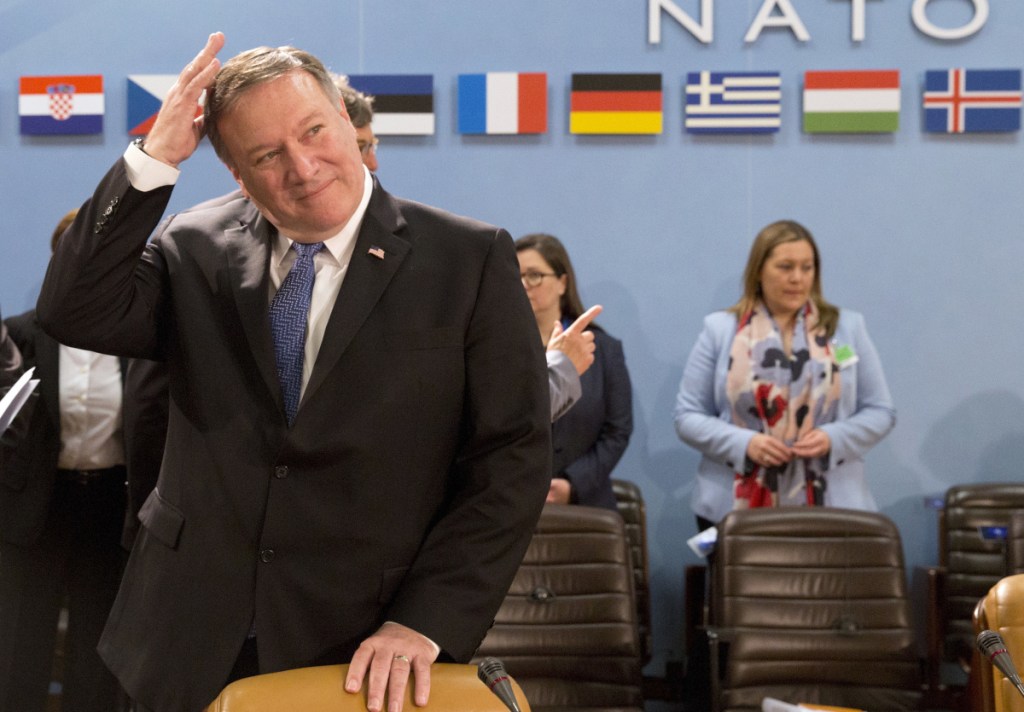RIYADH, Saudi Arabia — Secretary of State Mike Pompeo arrived in Saudi Arabia on Saturday, the start of a Middle East visit that officials said he would use to call on European and other nations to impose further sanctions against Iran.
Pompeo reached the Saudi capital shortly after Iran-backed Houthi rebels in Yemen said they had fired eight ballistic missiles at Saudi Arabia’s southern city of Jizan.
The Saudi civil defense directorate said one person was killed by shrapnel from the attack, which damaged two houses. It said four missiles were intercepted by the kingdom’s air defense forces.
Senior U.S. officials traveling with Pompeo blamed Iran for smuggling the missiles into Yemen. They said the incident underscored the importance of the Trump administration’s push to counter Iranian-supported aggression in the region. Iran has backed the Houthi rebellion in Yemen and is helping Syrian President Bashar Assad’s government fight rebels.
Pompeo planned talks with the Saudi king, crown prince and foreign minister just weeks ahead of several key dates that could further roil the volatile region.
After leaving Saudi Arabia on Sunday, Pompeo will fly to Israel and Jordan before ending his first trip abroad as America’s top diplomat.
The officials said Iran’s long- and medium-range missile programs had to be countered as part of efforts to strengthen the Iran nuclear deal, from which President Trump has threatened to withdraw.
The officials said Pompeo would call on other nations to impose tougher sanctions against Iranian people, businesses and government agencies involved in missile development. They said he’d stress the U.S. commitment to the defense of Saudi Arabia, Israel and other friends and partners in the region.
The officials traveling with Pompeo said the secretary would also raise Trump’s concern about the festering dispute between Qatar on one side and its Gulf Cooperation Council partners Saudi Arabia, Bahrain and the United Arab Emirates on the other.
The dispute, the officials said, is hampering unified efforts to confront Iran’s increasing assertiveness and giving Iran room to expand its influence.
Pompeo will also press the Saudis on contributing more to stabilization efforts in territory in Syria recently liberated from the Islamic State.
The officials were not authorized to publicly preview Pompeo’s meetings with Saudi leaders and spoke on condition of anonymity.
Trump has set a May 12 deadline to decide whether to pull out of the Iran nuclear deal, something he appears likely to do despite heavy pressure from European and other parties to stay in.
Two days later, the U.S. plans to open its new embassy in Jerusalem. That will mark a significant shift in decades of American policy toward Israel and the Palestinians, who also claim the holy city as their capital.
The embassy move is deeply opposed by the Palestinians, who on May 15 will mark the anniversary of what they term the “nabka,” or catastrophe, when they fled or were driven from their homes during the 1948 Palestine war. Dozens of Palestinians have been killed by Israeli fire during recent violent protests along border between Israel and Gaza.
On Friday at a NATO foreign ministers meeting in Brussels, the first stop on his trip, Pompeo repeated Trump’s pledge to withdraw from the Iran deal unless it is significantly strengthened. He said the U.S. was “unlikely” to stay in if that was not done.
“Absent a substantial fix, absent overcoming the shortcomings, the flaws of the deal, he is unlikely to stay in that deal past this May,” Pompeo said.
Copy the Story LinkSend questions/comments to the editors.



Success. Please wait for the page to reload. If the page does not reload within 5 seconds, please refresh the page.
Enter your email and password to access comments.
Hi, to comment on stories you must . This profile is in addition to your subscription and website login.
Already have a commenting profile? .
Invalid username/password.
Please check your email to confirm and complete your registration.
Only subscribers are eligible to post comments. Please subscribe or login first for digital access. Here’s why.
Use the form below to reset your password. When you've submitted your account email, we will send an email with a reset code.